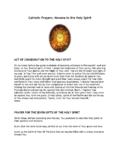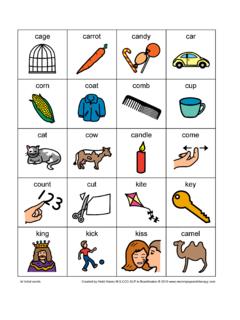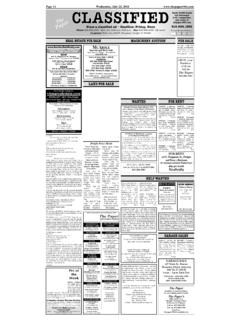Transcription of 121 F.3d 729, 326 U.S.App.D.C. 276 BEFORE: WALD, …
1 United States Court of Appeals,District of Columbia re sealed 729, 326 276 Argued Feb. 20, June 17, Published in Unredacted Form Aug. 29, : WALD, GINSBURG, and ROGERS, Circuit 29, 1997 Per light of the recent indictment of former Secretary of Agriculture, Mike Espy, it is no longernecessary to maintain under seal any portion of the Court's opinion issued on June 17, 1997. It is,therefore, ORDERED, on the Court's own motion, that the opinion be amended as follows:The previously sealed portions are hereby unsealed. The Clerk is directed to file and issue theunredacted 24 of the opinion issued on June 17, 1997, shall be from the United States District Court for the District of Columbia ( ).Theodore S. Greenberg, Deputy Independent Counsel, Alexandria, VA, and CharlesM. Kagay, Chief Appellate Counsel, San Francisco, CA, argued the cause for appellant, with whomDonald C. Smaltz, Independent Counsel, Los Angeles, CA, was on the Neil Eggleston, Washington, DC, argued the cause for appellee, with whom Mark I.
2 Levy andDemitri J. Nionakis, Washington, DC, were on the : WALD, GINSBURG and ROGERS, Circuit , Circuit Judge:This case involves an effort by the Office of the Independent Counsel ( OIC ) to compelperformance of a subpoena duces tecum issued by the grand jury investigating former Secretary ofAgriculture Alphonso Michael (Mike) Espy ( Espy ) and served on the Counsel to the President( White House Counsel ). The White House provided several folders of documents to the OIC inresponse to the subpoena but withheld 84 documents as privileged. After ordering that the withhelddocuments be produced for in camera review, the district court upheld the White House's claims ofprivilege in full. We now vacate the district court's opinion and remand for the court to conduct amore detailed review of the documents consistent with the principles set out in this BACKGROUNDA. Factual BackgroundAllegations that Espy may have improperly accepted gifts from individuals and organizations withbusiness before the Department of Agriculture ( USDA ) first surfaced publicly in March of1994.
3 These allegations led to the appointment of an Independent Counsel, on September 9, 1994,to investigate whether Espy had unlawfully accepted gifts and related matters and to prosecute anyrelated violations of federal law that the Independent Counsel reasonably believed had occurred. SeeIn re Alphonso (Mike) Espy, No. 94-2 ( Spec. ); see also In re Espy, 80 501( ) (per curiam). This investigation into Espy's actions is still same allegations also led the President of the United States to direct the White House Counselto investigate Espy's conduct in order to advise the President on whether he should take executiveaction against Espy. On October 3, 1994, Espy announced his resignation, effective December 31,1994. A little over a week later, on October 11, 1994, the White House publicly released a report onEspy produced by the White House Counsel. The report stated that the President had asked the WhiteHouse Counsel to address two issues: (1) whether the President should direct that any further actionbe taken with respect to Secretary Espy's conduct; and (2) what actions should be taken to ensure thatsimilar incidents are avoided by other Members of the Cabinet.
4 After detailing several areas inwhich questions had been raised regarding Espy's conduct, the report concluded that no furtherexecutive action need be taken against Espy since he had announced his resignation, reimbursed thecost of questionable transactions, recused himself from matters involving meat and poultryinspection and undertaken screening measures for his travel. The report also recommended thatefforts be undertaken to ensure that all cabinet members and other executive branch officers be givenethics training and be familiarized with applicable ethical standards for executive branch October 14, 1994, the grand jury issued the subpoena duces tecum at issue in this case. Thesubpoena seeks all documents on Espy and other subjects of the OIC's investigation that were accumulated for, relating in any way to, or considered in any fashion, by those persons who wereconsulted and/or contributed directly or indirectly to all drafts and/or versions of the White HouseCounsel's report.
5 Within this broad category of documents relating to the White House Counsel'sreport, the subpoena specifically requests notes of any meetings in the White House concerning Espyand of any conversations between Espy or his counsel and White House employees. On October 20,1994, the White House issued a press statement stating that it had received a subpoena for documentsrelating to the White House Counsel's report and would comply with the subpoena. On November17, 1994, the White House produced several folders of documents for the OIC, which the WhiteHouse maintained represented all responsive documents except those withheld on the basis ofprivilege. On December 12, 1994, at the OIC's request, the White House produced a privilege logidentifying the date, author, and recipient of each document withheld as well as a general statementof the nature of each document and the basis for the privilege on which the document was privilege log indicated that 84 documents were withheld on grounds of the deliberative processprivilege, with one document additionally withheld on grounds of attorney-client privilege.
6 In aFN1later draft of the privilege log, the White House lists the privilege basis of all 84 documents as being executive/deliberative privilege. FN2FN1. Another document was initially withheld on grounds of attorney work productprivilege, but has since been It is clear from the briefs and oral argument in this case, as well as the district court'sopinion, that by executive privilege the White House is referring to the privilege thatattaches to confidential presidential communications. However, as we discuss below, seeinfra Part , executive privilege is generally used to refer to a wide variety of evidentiaryand substantive privileges that courts accord the executive branch. Consequently, we referto the privileges asserted by the White House more specifically as the presidentialcommunications privilege, or presidential privilege, and the deliberative process OIC negotiated with the White House for access to the withheld documents for several months,finally filing a motion to compel production on June 7, 1995.
7 The White House resisted the motion,arguing that the withheld documents came within both the privilege for presidential communications,recognized in United States v. Nixon, 418 683, 94 3090, 41 1039 (1974)(Nixon),and the deliberative process privilege that protects the deliberations and decisionmaking process ofexecutive officials generally. After a hearing on the motion to compel, the district court ordered theWhite House to produce the withheld documents for in camera review and the White Housecomplied. Each document produced was accompanied by an ex parte cover sheet that explained thepurpose of the document. The OIC also made an ex parte submission justifying the grand jury's needfor the documents. On September 30, 1996, the court denied the motion to compel. Thememorandum opinion accompanying the denial quoted from Nixon to the effect that the generalizedassertion of privilege [for presidential communications] must yield to the demonstrated, specificneed for evidence in a pending criminal trial, 418 at 713, 94 at 3110, but then concludedthat the White House had properly asserted the claimed privileges in this case.
8 In reaching thisconclusion, the court stated that it had carefully reviewed the documents, but did not discuss thedocuments in any further detail and provided no analysis of the grand jury's asserted need for OIC appeals from the district court's decision. The OIC argues that, at a minimum, the districtcourt's order should be vacated and the matter remanded because the district court failed to provideany account of its reasoning in denying the OIC's motion to enforce the subpoena. On the merits, theOIC maintains that the district court erred in denying the motion to compel because the White Househad waived its claims of privilege by releasing the final White House Counsel's report, stating itwould comply with the subpoena, and unduly delaying in invoking privilege. The OIC further arguesthat the presidential communications privilege does not apply to the withheld documents becausenone of the documents was sent to or received from the President; the only document that thePresident received regarding the Espy investigation was the White House Counsel's final report,which was publicly released.
9 Alternatively, the OIC claims that even if the withheld documents doenjoy the presidential privilege, the district court should have applied a less restrictive need standardthan that articulated in Nixon, because this case involves a grand jury subpoena instead of a criminaltrial subpoena, and the grand jury's need for the documents is sufficient to overcome the claims ofexecutive privilege raised in this case. Although the OIC does not separately discuss the applicabilityof the deliberative process privilege in any detail, it maintains in passing that the need to obtainevidence that may shed light on governmental misconduct outweighs the deliberative White House challenges each of these arguments. It insists that it has not waived its claims ofprivilege and that the withheld documents come under the presidential communications privilegebecause they were generated in response to the President's request for advice on whether to retaina cabinet officer, one of the President's core functions under Article II of the Constitution.
10 The WhiteHouse also notes that the deliberative privilege would apply to the documents in their entiretybecause the factual material in the documents is inseparable from the documents' deliberativeportions. The White House contends that the same standard of need applies when the presidentialprivilege is raised in response to a grand jury subpoena as when a criminal trial subpoena is involved,and the OIC has failed to demonstrate a sufficient need to justify release under either the presidentialprivilege or the deliberative process privilege. Finally, the White House maintains that, since thedistrict court reviewed the documents in camera, it provided sufficient explanation for its decisionto deny the motion to compel even though it did not discuss the documents Legal Background: On Executive Privilege Generally and the Deference Due to the District CourtSince the beginnings of our nation, executive officials have claimed a variety of privileges to resistdisclosure of information the confidentiality of which they felt was crucial to fulfillment of theunique role and responsibilities of the executive branch of our government.






